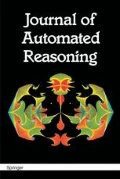Abstract
This paper makes use of the fact that relations provide a basis both for default reasoning and for handling preferences in decision making. This allows us to apply techniques from preference fusion to total preorders induced by conditional knowledge bases in order to obtain a new nonmonotonic inference relation called system ARS that refines and improves system Z. In particular, we prove the new system to handle irrelevant information more adequately. A comparison to related work shows that our approach fills in some gaps in the scenery of nonmonotonic inference relations beyond system Z and, in particular, complements Brewka’s work.
Similar content being viewed by others
References
Andreka, H., Ryan, M., Schobbens, P.: Operators and laws for combining preference relations. J. Log. Comput. 12, 13–53 (2002)
Arrow, K.J.: A difficulty in the concept of social welfare. J. Polit. Econ. 58(4), 328–346 (1950)
Benferhat, S., Cayrol, C., Dubois, D., Lang, J., Prade, H.: Inconsistency management and prioritized syntax-based entailment. In: Proc. of IJCAI’93, pp. 640–645, Chambry, 29 August–3 September 1993
Benferhat, S., Dubois, D., Prade, H.: Practical handling of exception-tainted rules and independence information in possibilistic logic. Appl. Intell. 9, 101–127 (1998)
Benferhat, S., Saffiotti, A., Smets, P.: Belief functions and default reasoning. Appl. Intell. 122, 1–69 (2000)
Brewka, G.: Preferred subtheories: an extended logical framework for default reasoning. In: Proc. of the 11th IJCAI, pp. 1043–1048, Detroit, August 1989
Brewka, G.: A rank based description language for qualitative preferences. In: de Mántaras, R.L., Saitta, L. (eds.) ECAI, pp. 303–307. IOS, Amsterdam (2004)
Delgrande, J.P., Schaub, T.H.: A general approach to specificity in default reasoning. In: Doyle, J., Sandewall, E., Torasso, P. (eds.) Proc. of KR’94, pp. 146–157. Kaufmann, San Francisco (1994)
Goldszmidt, M., Pearl, J.: Qualitative probabilities for default reasoning, belief revision, and causal modeling. Appl. Intell. 84(1–2), 57–112 (1996)
Goldszmidt M., Morris P., Pearl J.: A maximum entropy approach to nonmonotonic reasoning. IEEE Trans. Pattern Anal. Mach. Intell. 15(3), 220–232 (1993)
Kern-Isberner, G.: Conditionals in nonmonotonic reasoning and belief revision. Lecture Notes in Artificial Intelligence LNAI, vol. 2087. Springer, New York (2001)
Kraus, S., Lehmann, D.J., Magidor, M.: Nonmonotonic reasoning, preferential models and cumulative logics. Appl. Intell. 44(1–2), 167–207 (1990)
Lehmann, D.: Another perspective on default reasoning. Ann. Math. Artif. Intell. 15(1), 61–82 (1995)
Makinson, D.: General patterns in nonmonotonic reasoning. In: Handbook of Logic in Artificial Intelligence and Logic Programming: Nonmonotonic Reasoning and Uncertain Reasoning, vol. 3, pp. 35–110. Oxford University Press, New York (1994)
Pearl, J.: System Z: a natural ordering of defaults with tractable applications to nonmonotonic reasoning. In: Proceedings of TARK ’90, pp. 121–135. Morgan Kaufmann, San Francisco (1990)
Ritterskamp, M., Kern-Isberner, G.: Using preference fusion for default reasoning. In: Proc. of the Multidisciplinary Workshop on Advances in Preference Handling ’07, Vienna, September 2007
Ritterskamp, M., Kern-Isberner, G.: Preference-based default reasoning. In: Proceedings 21st International FLAIRS Conference, FLAIRS’08, Coconut Grove, May 2008
Spohn, W.: Ordinal conditional functions: a dynamic theory of epistemic states. In: Causation in Decision, Belief Change and Statistics, pp. 105–134. D. Reidel, Dordrecht (1987)
Author information
Authors and Affiliations
Corresponding author
Rights and permissions
About this article
Cite this article
Kern-Isberner, G., Ritterskamp, M. Preference Fusion for Default Reasoning Beyond System Z. J Autom Reasoning 45, 3–19 (2010). https://doi.org/10.1007/s10817-009-9129-6
Received:
Accepted:
Published:
Issue Date:
DOI: https://doi.org/10.1007/s10817-009-9129-6




